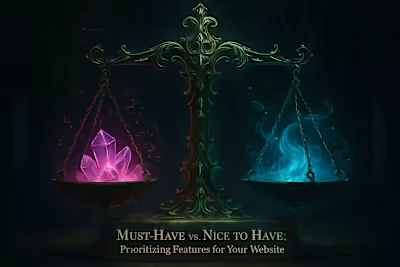Local vs. Remote Web Designers: Does Location Matter in 2025?

Local vs. Remote Web Designers: Does Location Matter in 2025?
The Advantages of Hiring a Local Web Designer
Personalized Communication and Collaboration
Deep Understanding of the Local Market
Accountability and Support
The Benefits of Hiring a Remote Web Designer
Access to a Global Talent Pool
Cost-Effectiveness
Flexibility and Efficiency
Making the Right Choice for Your Business in 2025
When Does Local Still Win?
When is Remote the Smarter Move?
The Future is Hybrid
References
Local vs. Remote Web Designers: Does Location Matter in 2025?
The world has changed. What used to be a simple choice between hiring the web designer down the street or the one across town has evolved into something much bigger. Today, you're choosing between someone you can meet for coffee and someone who might be sipping tea halfway around the globe.
This decision to hire a local web designer versus a remote one isn't just about geography anymore. It's about communication styles, project needs, and yes, your budget. The rise of remote work has completely transformed how we think about collaboration. But here's the thing - face-to-face meetings haven't lost their charm entirely. Some projects thrive on in-person brainstorming sessions, while others flourish with the efficiency of digital collaboration. Your choice can significantly impact your project's timeline, cost, and final outcome. And if you're still deciding between a no-code platform or custom coding, that decision will directly influence the type of designer you need.
The Advantages of Hiring a Local Web Designer
There's something to be said for the handshake deal. Local web designers bring unique advantages that go beyond just being in the same time zone. They understand your community because they're part of it. They know the local business landscape, the competition, and what makes your target audience tick.
Personalized Communication and Collaboration
Nothing beats sitting across from someone and sketching out ideas on a napkin. When you work with a local designer, those spontaneous "what if" moments happen naturally. You can pop by their office when inspiration strikes or when something needs immediate clarification.
Face-to-face meetings create a different dynamic. You pick up on subtle cues - the slight frown when something doesn't quite work, the excited gestures when an idea clicks. These nuances often get lost in video calls or emails. For many business owners, especially those who aren't tech-savvy, explaining their vision in person feels more natural and productive.
The collaborative process becomes more fluid when you're in the same room. You can look at designs together on the same screen, point at specific elements, and make real-time adjustments. This immediate feedback loop can significantly speed up the revision process. Plus, there's accountability in knowing you'll see this person at the local coffee shop or business networking event.
Deep Understanding of the Local Market
Your local designer isn't just creating a website - they're crafting a digital storefront for your community. They know that the trendy minimalist design that works in Silicon Valley might fall flat in your traditional Midwest town. They understand the local culture, values, and preferences because they live them every day.
This insider knowledge extends to your competition. A local designer has probably seen your competitors' websites, knows what works in your market, and understands what will help you stand out. They can optimize your site for local SEO naturally because they know the neighborhoods, landmarks, and local terminology your customers use when searching.
Local designers also bring valuable connections. They might know the best local photographer for your product shots or have relationships with other local businesses for cross-promotion opportunities. These connections can add tremendous value beyond just web design.
Accountability and Support
When your designer is part of your community, there's an inherent level of trust and accountability. They have a reputation to maintain locally, which often translates to exceptional service and support. If something goes wrong after launch, you know exactly where to find them.
This proximity makes ongoing support much simpler. Need a quick update? You can meet in person rather than scheduling video calls across time zones. Having technical issues? They can potentially come to your office to troubleshoot. This immediate accessibility provides peace of mind, especially for businesses that rely heavily on their web presence.
The relationship often extends beyond just business. Local designers become invested in your success because your success reflects on them within the community. They're more likely to go the extra mile, offer proactive suggestions, and genuinely care about your long-term growth.
The Benefits of Hiring a Remote Web Designer
The internet has made the world smaller, and nowhere is this more apparent than in web design. Remote designers offer advantages that were unimaginable just a decade ago. You're no longer limited to the talent within driving distance - the entire world is your talent pool.
Access to a Global Talent Pool
Imagine needing a designer who specializes in e-commerce sites for artisanal food products. In your local area, you might find a handful of web designers, but none with that specific expertise. Go remote, and suddenly you have access to designers who've built dozens of similar sites, understand the unique challenges of food photography online, and know exactly how to structure product pages for maximum conversions.
This global reach means you can find designers with incredibly specific skill sets. Need someone who's an expert in accessibility compliance? There's a designer for that. Want someone who specializes in conversion optimization for B2B SaaS companies? You'll find them online. This specialization often leads to better results because you're working with someone who truly understands your industry.
The diversity of perspectives is another huge advantage. A designer from a different cultural background might bring fresh ideas you'd never considered. They can help you think beyond your local market if you have plans to expand. Their different experiences and viewpoints can lead to more innovative, creative solutions.
Cost-Effectiveness
Let's talk money. Remote designers, especially those in regions with lower costs of living, can offer exceptional value. A highly skilled designer in Eastern Europe or Southeast Asia might charge half what a comparable designer in New York or San Francisco would. This isn't about compromising quality - it's about global economic realities.
These cost savings can be redirected into other areas of your business. Maybe you can afford additional features you initially cut from the budget. Perhaps you can invest in better hosting or marketing. The financial flexibility that comes with remote hiring can significantly impact your project's scope and success.
But cost-effectiveness goes beyond just hourly rates. Remote designers often work more efficiently because they're used to communicating clearly and managing projects independently. There's less time spent in lengthy meetings and more time focused on actual design work. This efficiency translates to faster project completion and lower overall costs.
Flexibility and Efficiency
Remote work has perfected the art of efficient communication. Remote designers are masters of project management tools, clear written communication, and organized workflows. They document everything, create detailed timelines, and keep you updated without constant check-ins.
The flexibility of remote work can actually speed up your project. While you're sleeping, a designer in another time zone might be making progress on your site. This "follow the sun" approach can dramatically reduce turnaround times. Need a quick revision? Your remote designer might be able to tackle it immediately, rather than waiting for the next business day.
Digital collaboration tools have evolved to the point where remote work is often more organized than in-person collaboration. Screen sharing, collaborative design tools, and project management platforms create a transparent workflow where you always know exactly where your project stands. Every decision, revision, and piece of feedback is documented and easily accessible.
Making the Right Choice for Your Business in 2025
The truth is, there's no universal "best" choice. The right decision depends entirely on your specific situation, project needs, and personal preferences. What matters most is finding a designer who understands your vision and can bring it to life, regardless of their location.
When Does Local Still Win?
Local designers shine when your business is deeply rooted in your community. If you're a local restaurant, retail shop, or service provider targeting customers within a specific geographic area, a local designer's market knowledge is invaluable. They understand the local culture, seasonal trends, and community values that can make or break your online presence.
Face-to-face collaboration remains powerful for certain personality types and project types. If you're someone who thinks best out loud, who needs to see physical mockups, or who values the energy of in-person brainstorming sessions, local is your best bet. Complex projects with many stakeholders often benefit from the ability to gather everyone in one room.
Local also wins when ongoing, hands-on support is crucial. If you're not tech-savvy and anticipate needing regular help with updates, having someone who can physically come to your location is reassuring. The peace of mind that comes with knowing your designer is just a short drive away can be worth any additional cost.
When is Remote the Smarter Move?
Remote hiring makes sense when you need specialized expertise that's rare or unavailable locally. If your project requires cutting-edge skills, specific industry knowledge, or experience with particular technologies, casting a wider net dramatically increases your chances of finding the perfect match.
Budget-conscious projects often benefit from remote hiring. If you're a startup watching every dollar or a small business trying to maximize your web presence investment, the cost savings of remote work can make a significant difference. These savings don't mean settling for less - they mean getting more value for your investment.
Businesses with national or global ambitions should seriously consider remote designers. They bring perspectives beyond your local market and can help you create a web presence that resonates with diverse audiences. Their experience working with international clients can be invaluable as you scale.
The Future is Hybrid
Here's what really matters in 2025: talent, communication, and results. The best designers, whether local or remote, share certain qualities. They listen carefully to your needs. They communicate clearly and regularly. They deliver on time and on budget. They care about your success.
Technology has evolved to the point where location is less of a barrier than ever before. Video calls feel almost as personal as in-person meetings. Collaborative tools make remote work seamless. The distinction between local and remote continues to blur.
The smartest approach might be staying open to both options. Start by defining what you really need: specific skills, budget constraints, communication preferences, and support requirements. Then look for the best designer who meets those needs, regardless of where they're located.
Some businesses are even adopting hybrid approaches. They might hire a remote designer for the initial build but partner with a local professional for ongoing maintenance. Or they work with a local designer who collaborates with remote specialists for specific features.
The web design landscape in 2025 rewards those who focus on outcomes rather than outdated notions about location. Whether your perfect designer is around the corner or across the ocean, what matters is their ability to understand your vision and transform it into a website that drives your business forward.
Quality transcends geography. A talented remote designer who communicates well and understands your goals will deliver better results than a mediocre local designer, and vice versa. The key is being clear about your priorities and finding the designer who best aligns with them.
As we move forward, the question isn't really "local or remote?" It's "who can best bring my vision to life?" Sometimes that person is in your neighborhood. Sometimes they're on another continent. The beauty of 2025 is that you have the freedom to choose based on talent and fit rather than limiting yourself to whoever happens to be nearby.
The future of web design is about connections, not locations. It's about finding the right partner for your project, building a strong working relationship, and creating something amazing together. Whether you meet in a local coffee shop or a Zoom room, what matters is the quality of the collaboration and the results you achieve together.
References
Like this project
Posted Jun 30, 2025
Should you hire a local web designer or expand your search globally? Explore the benefits of both local and remote talent to make the best hiring decision in today's digital world.










